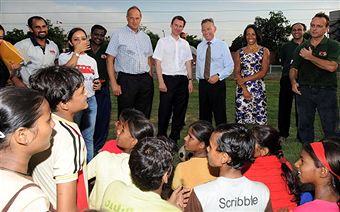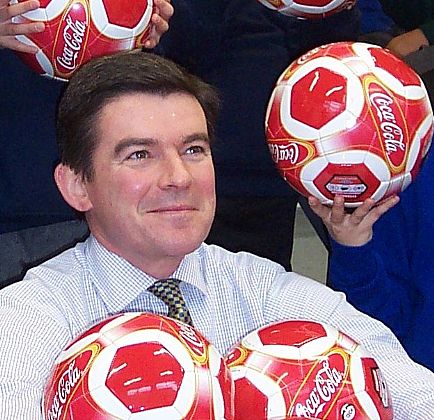English football presents a contradiction that could well be the subject of a novel, but not even the greatest of novelists could come up with a solution to its problems.
The last week has provided a vivid illustration of that. It saw a representative of football accompany the Prime Minister David Cameron as he went on his “mission with humility” to India hoping to sell goods and services to the country Britain once ruled.
That representative, of course, was Richard Scudamore, the feisty chief executive of the Premier League. The Premier League could hardly hide its pride that Downing Street particularly asked Scudamore to be on the Prime Minister’s plane, a sporting representative in a sea of business tycoons.
Cricket, that great gift of the English to India, may be the sporting religion of the Indians, but football, particularly the Premier League, is immensely popular in India. On their television screens Indians see more Premier League matches live than we do here and clubs like Manchester United, Arsenal and Chelsea are household names at least in urban India. Even in the Kolkata Metro, the one clean spot in this not very clean city, television screens dotted round the platforms endlessly replay Premier League matches.
 Cameron, by insisting Scudamore (pictured left, next to Dame Kelly Holmes in New Delhi) went with him on this trade mission, was merely recognising that the Premier League is the most famous brand this country has produced in the last 20 years.
Cameron, by insisting Scudamore (pictured left, next to Dame Kelly Holmes in New Delhi) went with him on this trade mission, was merely recognising that the Premier League is the most famous brand this country has produced in the last 20 years.
While once famous brands such as Jaguar and Land Rover are now owned by Indian firms like Tata, the Premier League shows that there is something for which the British can take on the world and come first.
And recall when the Premier League started La Liga of Spain and Serie A of Italy were the leaders, now they have to accept the hegemony of the English product.
Yet at the same time as Scudamore was getting ready to fly out with the Prime Minister, a dining room of the House of Commons was witnesessing the anger many MPs feel about football, an anger that is focused on the Premier League and its clubs.
At a seminar on football finance, MPs led by Clive Betts, the captain of the Commons football team, made it very clear they see football as in urgent need of reform. Their anger centred on the money the Premier League made, the feeling that this money made the rich richer with the result that obscene wages are paid to players but so little of the money trickle downs to the grass roots that it does not enrich the game.
The clubs in search of glory are allowed to run up huge debts. To make it worse the worldwide popularity of the Premier League does nothing for the national team whose dire state was underlined by its performance in the World Cup.
Now you could say that MPs like Betts were being unduly critical of football and venting their spleen at the national game for the failure of the national team in the 2010 World Cup. And in the process they were being unfair on football.
After all just look round. This week as the Prime Minister has been wooing the Indians three other major sporting events, two of them internationals, have been taking place. It has been the week of Glorious Goodwood, the European Athletics Championships have been taking place in Barcelona and a Test match between England and Pakistan was at Trent Bridge.
At the start of Goodwood Lord March, who owns the race course, frankly confessed to me that he feared for the future of flat racing. Racing he said needs a revolution modelled on the English Premier League.
As for athletics and cricket both events were well televised, one on the BBC, the other on Sky, yet what united both athletics in Spain and cricket in the Midlands was that, at both venues, vast areas of the ground had no spectators. In the way television works, cameras did not dwell on such empty stands but there was no escaping that fact. This was so evident at Trent Bridge that The Times even sent its racing correspondent Alan Lee from Goodwood to Trent Bridge to pontificate on why English crowds, unless it is an Ashes series, don’t go to Tests.
This is something that would be inconceivable at a Premiership, an England match or even at the better class of Championship matches. It is testimony to the popularity of the round ball and the Premier League is always quick to point out how football attendances have consistently increased in the last 15 years. In other words football, or at least the Premier League, must be doing something right as the punters keep coming.
But this popularity cannot hide the fact that at the heart of football there remains a dysfunctional relationship between the Premier League and the FA or, as MPs in the House put it, the Premier League tail is wagging the FA dog.
The problem has become more acute since the FA’s first independent chairman Lord Triesman had to depart suddenly in embarrassing circumstances. Any plans for the reorganisation of the FA and in particular a new chairman have been put on hold until FIFA votes on England’s bid to stage 2018.
It is easy to see why everybody concerned is keen not to rock the boat until that December vote. However this does not mean that there are not people in Government and parliament who are eager to tackle the issue.
 Let me remind you of what Hugh Robertson (pictured), now the Sports Minister, said in the run up to the election. He told me that the Tories would give football until the summer to sort its house out. “The national game,” he said, “needs to deal with four issues. The fit and proper person test for club owners, transparency so that people looking at football clubs can see exactly what’s going on, the whole question of debt as a percentage of turnover, and governance.
Let me remind you of what Hugh Robertson (pictured), now the Sports Minister, said in the run up to the election. He told me that the Tories would give football until the summer to sort its house out. “The national game,” he said, “needs to deal with four issues. The fit and proper person test for club owners, transparency so that people looking at football clubs can see exactly what’s going on, the whole question of debt as a percentage of turnover, and governance.
“There are far too few people that sit on football boards, either in clubs or the governing bodies, that act independently. Most are part of the game’s vested interests.”
He went on to warn, “If by the end of the summer the FA, the Premier League and the Football League have not come up with a proper plan to address these four issues, then the Government will have to step in. One of the options would be an independent regulator to run the game.”
True, politicians have spoken in the past about appointing a regulator to run the game, but generally when they were backbenchers with no power to implement the idea. Gerry Sutcliffe, Labour’s Sports Minister, did so when he was on the backbenches but forgot about it in Government.
However, come December and should England lose the 2018 World Cup bid, then I suspect, given the way many politicians feel about football, there may well be support for a regulator which could lead to one of the biggest shake-ups the game has seen. This will be fuelled by questions as to why a rich game like football needs public money to host the World Cup. More so as the event ends up making more money for FIFA than the host country as South Africa has discovered.
If football thought its problems were over then it could not be more wrong. The hard questions are just about to start.
Mihir Bose is one of the world’s most astute observers on politics in sport and, particularly, football. He formerly wrote for The Sunday Times and The Daily Telegraph and until recently was the BBC’s head sports editor. His latest book, “World Cup 2010 South Africa: the Teams, the Players, the Venues”, is available now.
.jpg)